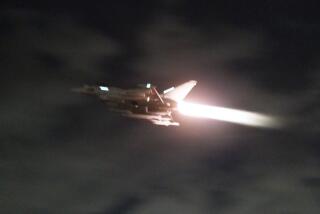U.S. Sees Signs of Iraqi Action Against Shiites : Mideast: Official warns that Washington would react forcefully.
WASHINGTON — Although Iraq has not challenged the 4-day-old ban on the use of its aircraft in the southern part of the country, there are indications that Saddam Hussein’s regime is readying a new ground offensive against rebellious Shiite Muslims in the area, a top U.S. official said Sunday.
“There are a couple of divisions in the south that have moved out of their garrisons, and there have been signs of preparation for another ground offensive for several weeks now,” White House National Security Adviser Brent Scowcroft said on the NBC-TV program “Meet the Press.”
Scowcroft left little doubt that Washington would react forcefully to any new Iraqi attacks against the mainly Shiite population of the south. “I wouldn’t want to say exactly what we would do, but I think Saddam ought to take the prospect very seriously,” he said.
In Baghdad, Hussein vowed to resist what he called U.S. efforts to partition the Arab world and seize control of Middle East oil supplies. But he also indicated that he is in no hurry to provoke a showdown with the militarily more powerful Western nations.
“The leadership is determined to reject the bold aggression and confront it with all means available and on all levels,” the official Iraqi News Agency quoted Hussein as saying.
“We will not be deceived by the slogans they have raised justifying their ban on flights in southern and northern Iraq (where a similar “no-fly” zone has been in effect for months),” Hussein said in a speech read for him by an announcer on Iraqi television and radio. “These slogans are a conspiracy to eliminate Iraq’s historical role in (the Arab world) and partition the region to seize control over its oil wealth.”
But he also counseled caution.
“I realize that the young among you can’t stand this aggressive and infidel act and are burning with wrath, wanting to respond,” he said. “I don’t want to hide that we (leaders) like you have the same feelings, but we in the leadership resort to patience, which God wants.”
In a warning directed at Saudi Arabia and Kuwait, Hussein said, “Any country in the region that provides facilities to the forces of aggression will alone shoulder the responsibility toward its people and toward God and bear the consequences of such an unforgivable action.”
Iraq has done nothing, so far, to challenge the exclusion zone that was imposed Thursday by the United States, Britain and France. The allied nations said they would shoot down any Iraqi aircraft in the zone to enforce a U.N. Security Council resolution forbidding Iraqi oppression against the mainly Shiite population in the region bordering Saudi Arabia and Kuwait.
Lt. Gen. Michael Nelson, commander of the Western military operation, told reporters aboard the Navy’s Persian Gulf flagship that Iraq seemed to be complying with the no-fly orders, regardless of how much the country’s leadership might resent them. But he said Iraqi action on the ground was less predictable.
In Baghdad, meanwhile, three U.N. guards said that they narrowly missed being blown up by a time bomb that was fastened to the undercarriage of their car at an Iraqi military checkpoint in northern Iraq last week.
The Thursday incident could spark a serious new clash between Iraq and the United Nations, which has seen its guards, inspectors and humanitarian aid employees harassed, shot at and, in one case, killed in Iraq over the last three months. It came to light on the eve of today’s arrival of a U.N. weapons inspection team.
Iraqi officials have hinted that they may refuse to cooperate with the weapons inspectors or with humanitarian aid teams as a response to the no-fly zone. But U.N. officials said they will go ahead as scheduled with the inspection.
More to Read
Sign up for Essential California
The most important California stories and recommendations in your inbox every morning.
You may occasionally receive promotional content from the Los Angeles Times.










